Building a business from the ground up is no easy feat, even if you have experience in the realm of business or sales. In order to achieve success, you must have a genuine understanding of your target audience and market as well as the product or service you represent. Once you land on a winning product, learning how to manage your business without believing you are bigger than it is essential to ensure the longevity of your venture and the future you see for yourself.

Becoming a True Leader
Working towards becoming a CEO, or a Chief Executive Officer, often requires years if not decades of loyalty and hard work for many businesses and Fortune 500 companies today. However, if you are working on building your very own business, it is important that you understand the importance of being a true leader.
As a business owner, you may immediately consider yourself the CEO, especially if you are working alone.
It is important to avoid developing an ego in business right off the bat, especially as you are establishing yourself as a new professional player in a specific market or niche. Having an ego in business without having a strong background in the industry you represent can lead to bad business or cause others to view you negatively, avoiding any opportunity you may have to work together.
It does not matter if you are a sole practitioner or if you have hundreds of employees, a true CEO is someone who takes responsibility and is 100% in charge of the overall trajectory of their business as an organization and brand. Once you realize that your business is much bigger than you, you’re on your way to becoming a “real” and true CEO.
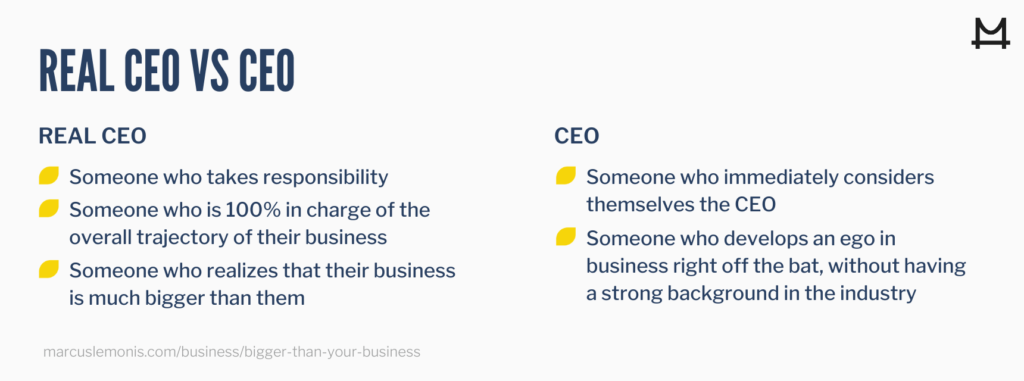
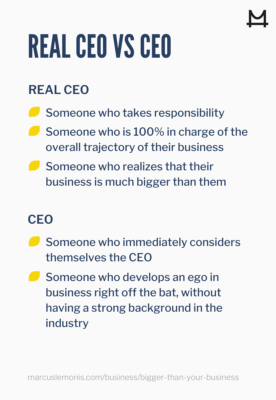
Five Key Responsibilities of a CEO
There are five key responsibilities of a CEO that will come into play once you begin to focus on the overall operation of your business itself. The key responsibilities of a CEO include:
1. Creating and Owning the Vision
Creating and owning your vision is one of the most important elements of becoming a CEO. Once you are no longer handling the day-to-day tasks, it is imperative to craft and stick to a vision that is right for your business and brand.

2. Making Decisions That Impact Multiple Functions
As a successful CEO, you will need to learn how to make decisions that impact multiple functions across your entire business, from accounting to marketing and sales.
3. Provide Resources Across the Organization
In order to lead effectively, you will need to provide resources to employees, investors, partners, and even clients as necessary across your organization to keep your business running without issue.
4. Build the Culture
Building a culture is essential in today’s highly competitive workplace. Without an attractive company culture, you will likely experience a high turnover rate when it comes to clients as well as your own employees.
In one example of a company that needed to work on improving its culture, Marcus Lemonis met with the owner of a struggling health food company targeted towards athletes and individuals looking to lead a healthy lifestyle.

The owner made a bit of an abrasive first impression upon meeting Marcus, which set the tone for their interactions. Early on, Marcus discovered that the owner had troubling encounters with his employees and was using intimidating tactics to make sales and generate revenue, creating a negative culture that Marcus was concerned by. Although Marcus attempted to work with the owner by offering help for a 51% stake in the business, he soon learned that the owner also had additional investors who were not part of their original deal, prompting Marcus to simply walk away. There were a few too many red flags in this company’s culture.
5. Deliver the Performance
Having the ability to not only appeal to customers and market your product but also deliver the performance is key as a CEO. Knowing how to manage inventory, oversee quality control, market to your consumers, and ensure customer satisfaction are all important skills necessary as a CEO of any company, regardless of size. As CEO, ultimately the buck stops with you. It’s imperative that you understand your operations, know your numbers and have the drive to succeed.

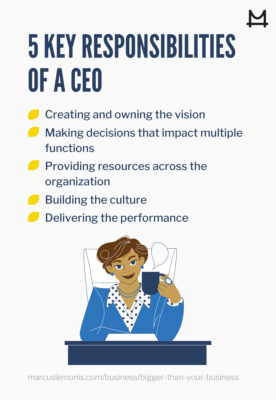
Transitioning From Generalist to Specialist
The process of building a business requires plenty of effort and work in all facets of owning and operating a business itself. Somedays, you may find yourself researching and managing inventory – and other days, you may launch marketing campaigns and attend networking conferences. As your business begins to scale and expand, transitioning from generalist to specialist is imperative to avoid falling behind and missing out on additional potential growth opportunities. Determine which skills of yours are most valuable to your business and hone in on them while hiring out and delegating other tasks involved in keeping your company running.


Never Stop Learning
Some of the most successful business owners and entrepreneurs claim that their penchant for learning has helped them on their journey to success. Always searching for something new to learn will keep you open minded and willing to expand your current outlook as well as your reality. As Marcus says, “You don’t have to be a genius to run a successful small business, but you better be smart enough to be willing to learn.”
10 Bad Behaviors From a Bad Boss
Knowing how to identify bad behaviors that are common in bad bosses can help you to avoid them yourself once you begin the hiring process for your own business.

1. They Take Credit for Your Work
Bosses that take credit for the work of employees cause bad workplace morale and may even cause tensions to rise. Always give credit where it is due to show your employees that you care and that you appreciate their hard work and effort.
2. They Don't Appear to Trust or Empower Anyone in the Company
Employees who do not feel trusted or empowered as well as appreciated are less likely to give their best efforts each day they arrive to work.

When Marcus stepped in to help a sports apparel company falling into debt, he soon realized that the company was struggling with a myriad of issues, even more than the crippling debt that was about to bankrupt them. Marcus discovered that the company was being run similarly to a sweatshop, and the owner of the business had multiple employee complaints highlighting his ability to manage and lead.
Unfortunately, after ultimately also learning that another one of the owners had a disturbing side gig, he decided to back out of the offer to help the company altogether.
The owners simply did not take their business seriously and failed to properly lead and empower their employees along the way. As Marcus says, “Your job as the CEO of the business is to be the coach. Rather than running people under the bus, you’ve got to get them on the bus with you.”
3. They Don't Care if People are Overworked
When the work/life balance of an employee is not respected, they may begin to search elsewhere for a job or they may begin to lose motivation to remain productive in their current position over time.

4. They Don't Advocate for You When Considering Monetary Compensation
A bad boss will avoid advocating for you when it comes to asking for raises or seeking additional monetary compensation for the work you have done.
A great boss will listen intently to employees who have serious and legitimate concerns or questions.
5. They Promote the Wrong People
A boss that plays favorites sets a negative tone and bad precedent for employees and workplace morale. Rewarding promotions based on merit is advisable regardless of the individual who is working for you.
6. Not Backing Up You and Your Team
Bad bosses avoid having the backs of employees, which diminishes workplace morale and can turn employees against one another, clients, and even their boss. When situations arise, a good boss will listen to their employees and make decisions based on the facts.

7. Does Not Provide Proper Direction
When a boss does not provide proper and adequate direction, employees are more likely to feel lost and confused, leading to worsened productivity and bad business throughout the workplace.
8. Micromanagement
Micromanagement can lead individuals who need time alone or space to work to feel overcrowded or anxious, and they may burnout much quicker. A boss that micromanages is also not providing individuals with the time necessary to complete tasks autonomously, which can ultimately lead to slower production rates.
9. They Focus on People's Weaknesses Instead of Their Strengths
Bad bosses tend to focus on people’s weaknesses instead of focusing on strengths of individual employees that may be beneficial in the workplace. A boss who is more intent on focusing on weaknesses is not likely to appear as an effective leader to employees and business partners.

10. They Do Not Set Clear Expectations
If a boss avoids setting clear expectations for their employees, they are much more likely to encounter communication issues and slower productivity in the workplace. Setting clear expectations for all employees, contractors, and business associates goes a long way when it comes to maintaining success for your business as a CEO.
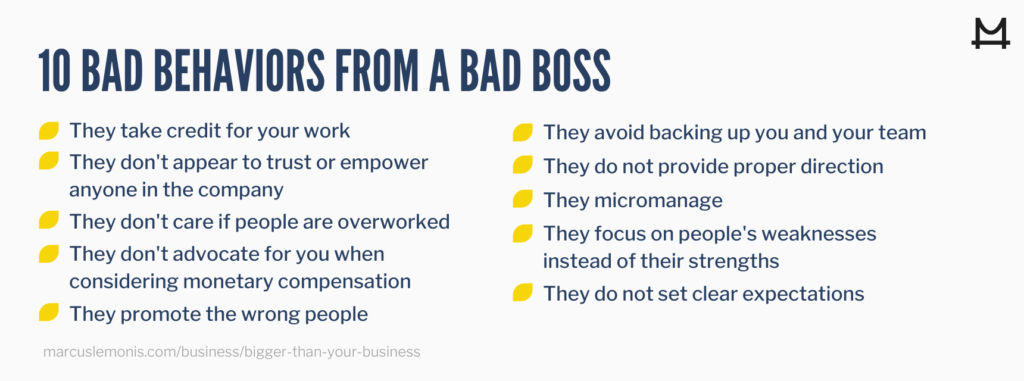
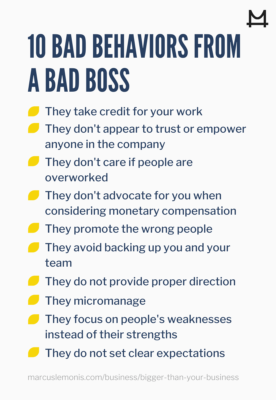
Creating and maintaining a successful business requires more than the ability to develop and sell a product that is currently in-demand. In order to truly build success as a real CEO, remaining authentic and full of vision is a must. When you take your role as CEO seriously, it is much easier to solidify your own place in any market or industry.
- Are you exhibiting any of these negative behaviors as a CEO?
- What are some ways to combat these negative behaviors?





